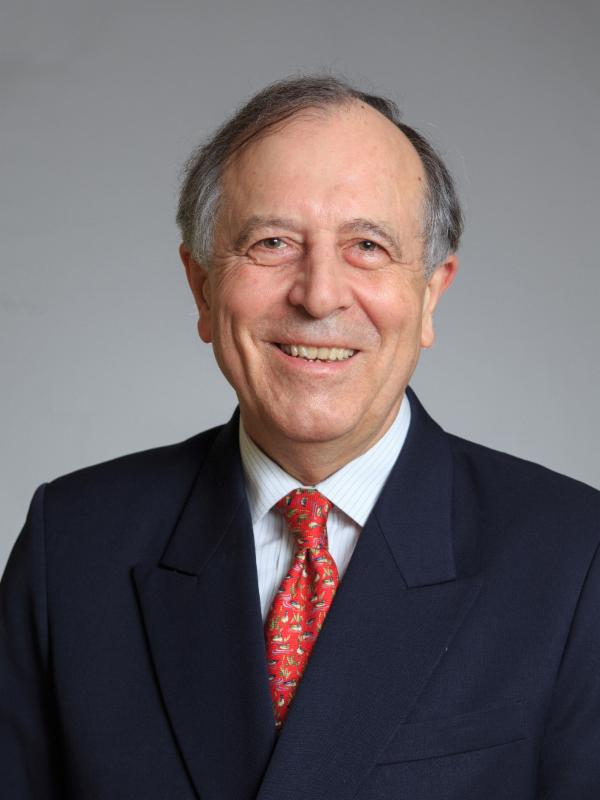 Friedrich Lohr’s international ambitions were thwarted early, when a high school English teacher convinced his parents not to let him go on an exchange program in the United States.
Friedrich Lohr’s international ambitions were thwarted early, when a high school English teacher convinced his parents not to let him go on an exchange program in the United States.
“I would become arrogant, is what the teacher told my parents,” Lohr says.
He has spent his entire career making up for this early mishap.
During college, in Germany, Lohr earned a one-year scholarship to study in France, followed by a Rhodes Scholarship to Oxford University.
He made it to the United States some 20 years later as a delegate to the United Nations, and again from 2007 to 2012 as German consul general to the New England states— essentially a public relations job, based in Boston, where he represented his country and even read poetry by Rainer Maria Rilke to the tunes of a piano at the Goethe Institut.
Boston was, perhaps, a less exotic assignment than some of his earlier posts, which took him to some of the world’s most complicated conflict zones. Now retired as a diplomat (or “recycled,” he likes to say), Lohr is a faculty member in the Master of Science in Global Studies and International Relations program, where he teaches “Europe after 1945,” “Politics of the European Union,” “Disarmament,” and “East Asian Studies.” In the latter class, he is able to place a particular emphasis on China and North Korea, because of his experiences there.
A career diplomat, Lohr arrived in Khartoum, Sudan, in 1985, just after the fall of the Nimeiri dictatorship, and spent two years there as the country prepared for the election of the first civilian prime minister. Then without continuous telephone service, he coordinated Germany’s aid assistance program for Sudan and traveled with delegations around the country during a low-level insurgency.
It was a far cry from his assignment a decade later in Algeria, a European-influenced oil- and gas-producing country, where foreigners were under threat from an Islamist guerrilla force that wanted to interrupt contact between the government and the outside world. As Germany’s chargé d’affaires, he lived from 1995 to 1997 inside a fortified apartment in the embassy. While avoiding terrorist explosions, Lohr’s goal, as in his other diplomatic posts, was essentially “to stay in touch.” That meant working 16-hour days, analyzing local papers for news that was politically relevant to Germany, serving as an intermediary with Germany, meeting with ministry and embassy staff, and supervising staff.
A Rare Post in North Korea
After a stint in China—where, as deputy chief of mission, he met his wife, a sales manager for Xerox—Lohr sought another assignment in Asia, so that he could be close to her while she worked in Beijing. He offered to go anywhere except for North Korea, which is precisely where he ended up, as the German ambassador to the country from 2005 to 2007. Germany is unusual in maintaining a North Korean embassy, Lohr says, and despite the relative isolation of his day-to-day life, it was fascinating to be there, given the lack of close contact between Westerners and North Koreans. Much of his work involved facilitating the delivery of humanitarian aid and agricultural assistance to a population plagued by food shortages.
More recently, while stationed in Boston, Lohr met Northeastern President Joseph Aoun, who invited him to teach a course. He had already taught at the University of Rhode Island and Suffolk University.
Breathing Life into International Relations
“Teaching in the United States is different from Germany or France, so I had a learning curve,” Lohr says, explaining that his university professors read texts aloud or extemporized, and students were expected to take notes and “follow the instructor’s recommendations.” But, teaching interactively came naturally, he says. The main challenges have been engaging students who, like him, grew up in cultures where they were expected to keep quiet and, more so, adapting his lectures to an online format.
Lohr tries to put shy students at ease by asking their opinions in class and by expressing that he will evaluate them for their knowledge and thoughts rather than for their mastery of English. His Chinese students are willing to offer their own perspectives in his “East Asia” class, and “we learn from each other,” he says.
For example, Lohr recently asked a Chinese student to give a presentation to the class on how much the Communist North Korean regime is based on Confucianism and how much on ancient Chinese feudalism. The student gladly added nuances to his teaching in an after-class conversation, which evolved into a fascinating in-class presentation.
Lohr brings ample practical knowledge to the classroom—for example, talking about how to create a U.N. resolution, which he did as a junior diplomat. “Imagine you’re a young, ambitious person working in your permanent mission, and you have a great idea for your country to introduce a resolution,” he says. “I teach them about organizing their colleagues, drafting amendments, and voting procedure. Some of my students might just go on to do that.”
Lohr’s graduate students—including those based in Turkey and South Korea and on U.S. military bases, as well as closer to home in Boston—have multiple reasons for studying international relations. Some want to join the U.N., become diplomats, or simply expand their knowledge of the world.
Although he has gotten used to giving taped lectures for his online courses without getting immediate feedback, the more unusual aspect is holding discussions on an online discussion board, he says. “I give questions, such as: ‘China is the largest dictatorship in the world. Who is the dictator?'” Students provide short or longer answers; they interact with one another, and he comments on each response.
“Instead of my sending messages to the world, the world comes to me.”
The United States has given him something he might not have had in Germany, says Lohr: the ability to keep teaching after the age of 65, a milestone he reached in 2012. In Germany, he explains, it is still hard for retired professionals, despite their valuable experience, to land teaching jobs.
“Here,” he says, “I can be an integrated faculty member who can teach students things they won’t find in the textbook.”






Related Articles
Why Earn a Professional Doctoral Degree?
5 Tips to Get the Most out of Grad School
Is Earning a Graduate Certificate Worth It?